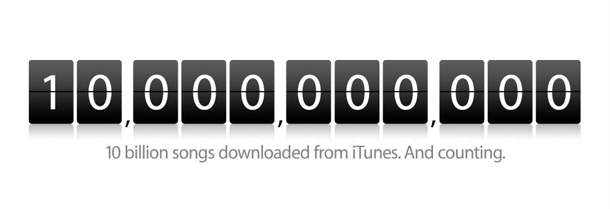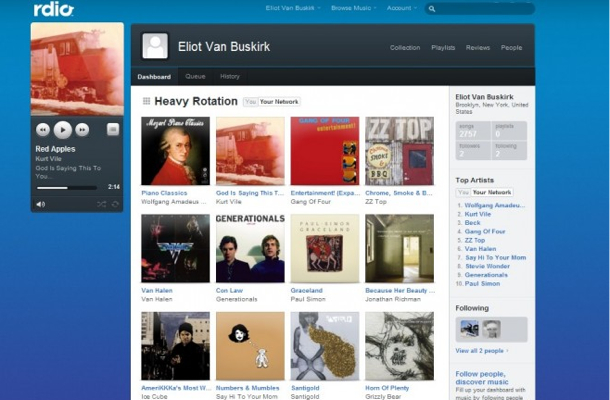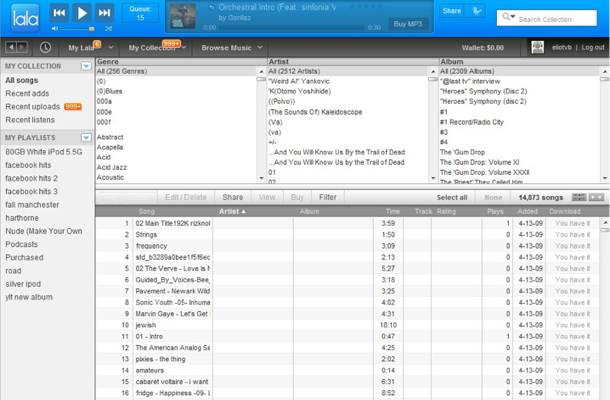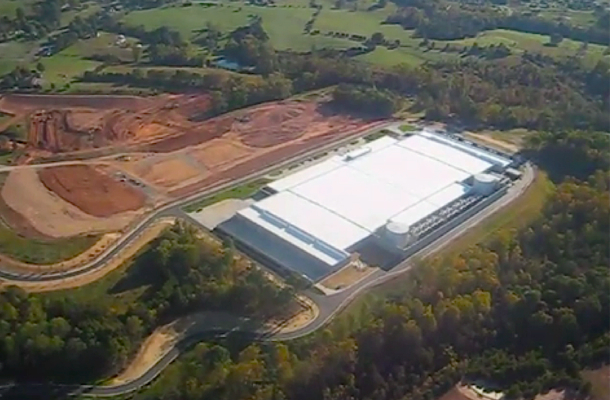Music sales accounted for $1.24 billion in revenue for Apple in the fourth quarter of 2010. Sounds impressive, but it actually only accounts for a small amount of the overall picture. Apple, theoretically, could survive without music sales altogether, but it doesn’t mean that it is time to give up on the industry quite yet.
Well over 10 billion song downloads was achieved last year on iTunes, which is mighty impressive for an industry that claims piracy is robbing it of opportunity. And this number is growing. Now it would appear that consumers are more willing than ever to fork out the cash to invest in music with Apple’s iTunes.

But Apple’s dominance of music sales is constantly being threatened, and it will be interesting to see how Steve Jobs responds.
Increasing Competition
There have been more opportunities than ever for users to gain access to music for cheap — and even for free — by legal means: Pandora Radio, Slacker Radio, Grooveshark, Spotify (not available in the U.S., yet), Rhapsody, SoundCloud, Rdio, and more are offering up all-you-can-eat music on the cheap.
For example, users can stream unlimited music to their computer, alone, for $5 per month or to their smartphones too for $10 per month with Rdio, which is an incredible service. With Grooveshark, however, you don’t even need to pay to have unlimited access to music on a desktop computer. Try doing that a few years ago.

There is a catch, of course: all of the aforementioned services require that users stream music to their devices — also, these users don’t actually own the music, they pay for access to it. But I have been a fan of these services. And, seriously, who really needs to spend hundreds of dollars on songs that might be listened to only a handful of times?
Well, apparently some people are still interested in shelling out their hard-earned cash for music downloads. Call it convenience, sympathy, interest, or simple willingness — but whatever it is, people are buying music, and that is a good thing for the industry and Apple.
But then came Lala…
Lala
Lala was a first of its kind. It allowed users to upload their music files and stream them online, purchase music for 10 cents to be listened to whenever a user wanted, or pay around a dollar to download and own an entire song.
When I first heard of this service, I jumped on the opportunity to use it. I immediately uploaded all my music files and began purchasing songs to stream. It was a fair compromise — pay a tenth of the value of the download and stream it whenever I wanted — that 10 cents even went towards the purchase price of the song download. It was almost amazing that they even managed to pull this arrangement off with the music labels.
All it really needed was mobile applications for iOS, Android, and Blackberry, and then it could have been the killer app — the first true competitor to iTunes. Unfortunately, though, Lala was killed off before that ever happened.
 =
=
Apple acquired the service on December 4, 2009, for an estimated $80 million. Many were quick to speculate about what this meant: was it an attempt to move Apple’s music to the cloud, to create a web-based interface for iTunes, or to prepare for the future of music distribution?
From what we have seen currently, it appears that it was none of the above. Instead, Apple purchased Lala as an insurance policy. It was a way for Apple to prevent the competition from stepping on their toes. And if it only cost Apple $80 million to save them from potentially hundreds of millions in lost potential revenue in the years to come, it was surely a wise decision from their perspective at the time.
Nothing ever became of that Lala acquisition. It was truly a shame to see such a great service get destroyed.
Instead, Apple has invested around a billion dollars in a new server facility in North Carolina. Why?
The Cloud
Apple’s North Carolina server farms are all about the cloud. Apple has stated that it will be handling MobileMe and iTunes data. This is to be expected when considering how much more involved Apple has become involved with the Internet. It is also true that consumers are demanding more on-demand access from cloud-based services. So, in the end, perhaps this $1 billion server facility is nothing more than a support system for everything that is already in place.
But could it be more?

After all, why spend $1 billion on a server farm when you could likely find ways to run existing server facilities more efficiently? Surely there are things that could have been done to offset such a necessity for a $1 billion investment.
That is exactly why I believe that this North Carolina facility will serve a much bigger purpose than Apple has led us on to believe.
The Music Locker
What if Apple’s Lala investment is finally becoming realized in the form of a new service that Apple intends to launch in the future? Perhaps it is a huge service that requires plenty of storage infrastructure to support it. Perhaps it is the future direction for Apple’s music ambitions.
As we said before, Lala was essentially a music locker with the ability to stream uploaded music, purchase the right to stream new music for free, or pay full price for song downloads. Why wouldn’t Apple capitalize on the ability to create a streaming music service?
Some have argued that doing so would be silly — that Apple would be cannibalizing their own iTunes music downloads by creating such a service. But just because Apple might not be willing to create such a service doesn’t mean that Apple’s competition isn’t looking into it.
Google has long been rumored to be creating a music locker service that would allow users to store their music online and stream it while also providing a way for users to purchase new music and stream it as well — considering how invested Google is in cloud services, it makes perfect sense. Amazon is also likely to have something up its sleeves in the music arena; the company was the first to sell DRM-free music, so who knows what is coming next? Finally, Spotify has been making a killing in places around the world by offering an iTunes-like experience without the expensive prices to purchase music.

Google and Spotify (if it can make it to the States) are in the best positions to cause Apple some headaches in the future.
But this is assuming that Apple isn’t planning something big of their own. Yet if Apple was willing to spend $80 million to protect its investment in music against Lala and then spend an additional $1 billion to further support it their music service, wouldn’t it make sense that Apple would be readying itself for such a thing?
I think they are. I think Apple has something huge planned, and I think it will be a completely new way to experience music within Apple’s ecosystem. It might be a music locker servier. it might be a subscription service. It might be a hybrid. Then again, it might be something completely different that will blow us all away. There is no real way of knowing for sure.
But to assume that they are not doing anything would be crazy at this point in the game. This is Apple we are talking about, and we know they are not going to go down without a fight!
